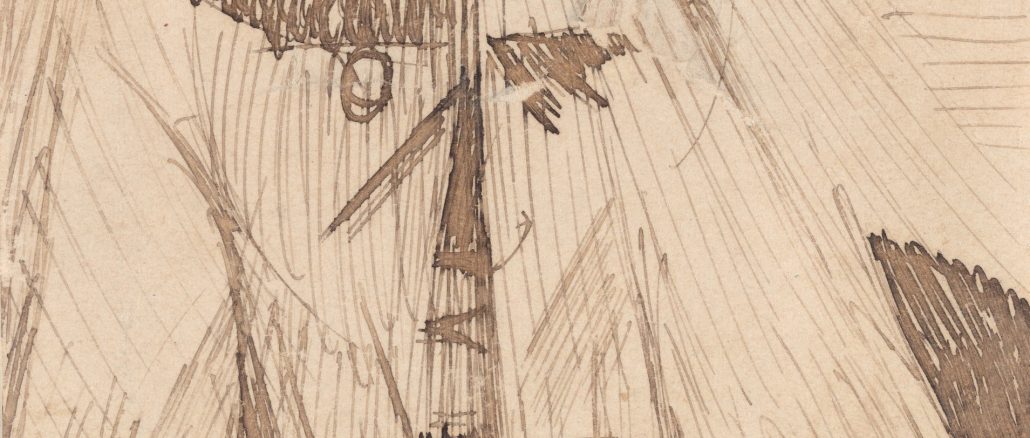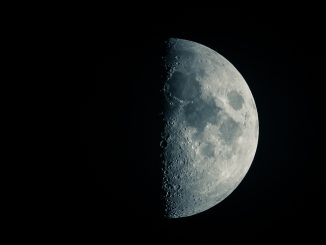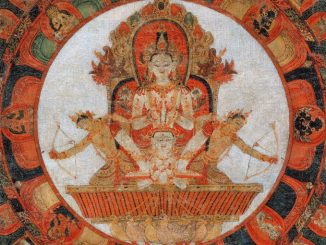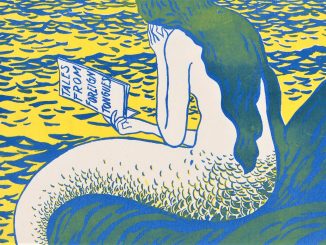
ORIGINS
Your father first glimpsed you in a dream. Waking, he turned toward me in the half-light of early morning and smiled, his face still creased where it had pressed against the pillow. “I just saw our baby; you held her in your arms. We’re going to have a girl.” That was a year before you were conceived.
∞
When you were in my belly, we didn’t consider names for boys. Your father was adamant there was no need, and I believed him. My family has a history of dreaming babies, too. Your name came to us easily. It has its roots in many cultures: Norse goddess; a tree with protective powers; a Gaelic name imbued with ancient magic, meaning Little Red One. We both knew it was fitting. My Iraqi friend shared that with only slight variations in pronunciation, your name exists also in Arabic, in Kurdish, and in Persian: River of Light, the Straight Path, the Pure Spirit.
∞
You were born in a snowstorm, delivered by scheduled caesarean section. Due to health complications, labour and vaginal birth were not options for you and me. On our drive to the hospital, your father navigated the slippery roads like a slow-motion rally driver, weaving past stalled cars as they skidded sideways or slid backwards on slick cambered roads. The city held its breath in a hush of thickly falling flakes, as though it were not just us but the larger world, waiting for you.
∞
My exposed belly, basted with brown-orange antiseptic, rose like a Thanksgiving turkey above the narrow operating table on which I lay. It was the fifth time in my life I’d lain on an operating table beneath a cold halo of electric light. The body carries many memories.
∞
The obstetrician didn’t wait for your father to finish scrubbing up before starting to cut. He talked ice hockey with our family doctor while he sliced into my body, as though I were incidental to the proceeding. Insentient. Invisible. I spoke aloud into the white room: “Where is my husband?” Something in my vitals went awry. The anesthesiologist, a note of urgency in his voice, called “Get the father in here NOW.”
∞
The cutting did not go smoothly. My body, lined with scar tissue from old surgeries, was reluctant to release you. Hockey talk abandoned, the obstetrician grunted with effort as he cut and pushed and pulled. My eyes rolled back into my head. The anesthesiologist added morphine into the drip; your father squeezed my hand and stroked my face. When you finally emerged, you were very quiet, though nurses slapped you.
NEURODIVERGENCE
Your hair shines rust-red in the snow-glare that leaches through the window into the dull green hospital room. Still damp from birth, you betray a hint of the crimped waves that will form when your hair grows longer. “She has her great-grandmother’s hair,” your father says. We look at you for a long time, that first afternoon you are in the world, learning your features, which seem both familiar and new. Your eyes are deep blue and look far away, as though your soul has not yet caught up with your body.
∞
At daycare the teachers call you Sensory Girl. You can often be found alone, sifting sand, squishing shaving cream, splashing water. At times you gaze into a distance too far for us to follow your line of sight. When your fingertips graze the softness of rabbit fur, your eyes close, and you float away in a reverie. When we camp at Killarney, you wade into the lake and forget we are there. We watch you scatter water droplets in a private, ecstatic dance—an intimate conversation between you and the beauty that surrounds you. Your father and I are awed at the mystery of it: this deep, strange joy of yours, this communion with a universe we divine is there but cannot fully know.
∞
In Grade 2, Little Red One, you observe the world around you and ask questions and absorb tiny, surprising details we do not notice without your help. You make art, tell stories, play. You take words literally; you take them to heart. You have a prodigious memory and a temper we struggle to contain. You can read, but your writing is a scrawl in mirror image. Telling time is hard; you try to read the clock from both directions. You tell us “I don’t like it when things change.”
∞
The paediatrician tells us there is a name for the constellation of your differences; it is Autism Spectrum Disorder (ASD). She administers tests, makes assessments, measures impact. Your father and I are not surprised at the results, yet we are shocked. You work hard to mask the degree to which you struggle to meet expectations in the neurotypical world. You are hyper-sensitive to external stimuli, finding some sensations exquisitely pleasurable, some intolerable. Words on paper are objects in space, divorced from their meanings until someone reads them aloud. You feel hurt and ashamed when some kids at school call you weird. You wonder if that might be true, and if the girl who called you “bad luck” might be right.
∞
When we explain the diagnosis of ASD to you, your face crumples and you fall silent, then ask to go to the park. Twenty minutes of swinging, climbing, sliding, then you come running. “Is Autism why I feel different?” you ask. “Is Autism why I say everything in my head before I say it out loud?” Your face is serious, thoughtful, lit from within. It’s as though something inside you has shifted—a question answered, a burden lifted. Later, sitting on our front porch, you confide in us that the people walking down our street make different sounds and that the sounds, together, make up a kind of music that you like to hear. Little Red One, I have written down what you said against a time when memory fails your father and me. It’s far too beautiful a thought to let fall into the slipstream of the day.
 DEBORAH ELDERHORST is an Australian-Canadian writer of creative nonfiction and literary fiction. Her work has appeared in Clover Press/Visible Ink’s 2018 anthology, “Trace,” The Tishman Review, and Phantom Billstickers Café Reader.
DEBORAH ELDERHORST is an Australian-Canadian writer of creative nonfiction and literary fiction. Her work has appeared in Clover Press/Visible Ink’s 2018 anthology, “Trace,” The Tishman Review, and Phantom Billstickers Café Reader.
Twitter: @ElderhorstDeb
Featured image: Umberto Boccioni, “Head Against the Light (The Artist’s Sister),” ink on paper, 1912, bequest of Lydia Winston Malbin, 1989, The Metropolitan Museum of Art.


